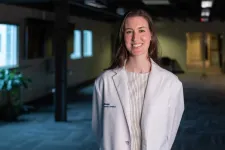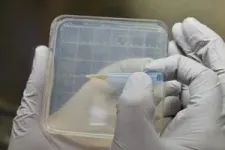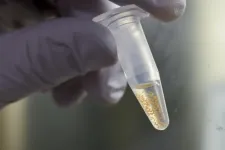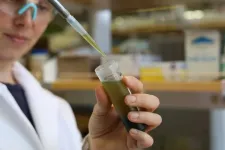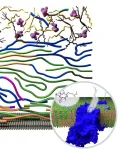(Press-News.org) Lafayette, La. – Ochsner Health is excited to announce that Mary Claire Curet, MD, is joining the team at St. Martinville Family Medicine, an Ochsner primary care practice. Dr. Curet, a native of New Iberia, is the first Ochsner Physician Scholar and brings a wealth of knowledge and a deep commitment to her community.
“We are thrilled to welcome Dr. Curet to the Ochsner family,” said Leonardo Seoane, MD, Founding Dean of Xavier Ochsner College of Medicine and Executive Vice President and Chief Academic Officer for Ochsner Health. “Her dedication and passion for primary care, particularly in underserved communities, align perfectly with our mission to provide high-quality, accessible, and compassionate healthcare for all the communities that we serve.”
The Ochsner Physician Scholars Program is designed to support and develop talented medical students committed to serving their communities. The program provides financial assistance, mentorship, and clinical training opportunities for medical students pursuing careers in primary care and psychiatry, in exchange for commitment to working at Ochsner. The program ensures that scholars like Dr. Curet are well-prepared to meet the healthcare needs of their patients.
Reflecting on her journey, Dr. Curet said, “The Ochsner Physician Scholars Program provided invaluable support throughout my medical school journey. I am honored to return to my roots and practice in St. Martinville, where I can give back to the community that has shaped me. I look forward to providing compassionate care and making a positive impact on my patients' lives.” Dr. Curet also shared that she hopes to finally learn how to make her favorite food, her grandmother’s shrimp and okra gumbo, something she missed while being away for medical school and her residency for so many years.
“Dr. Curet’s return to Louisiana and her commitment to serving the people of St. Martinville is a testament to the impact of the Ochsner Physician Scholars Program. We are confident that she will make a significant difference in the health and well-being of our community. I couldn’t be more excited to have her practicing right here in Acadiana,” said Ochsner Lafayette General Regional Medical Director Amanda Logue, MD.
Dr. Curet graduated summa cum laude with a Bachelor of Biological Sciences from Louisiana State University and earned her Doctor of Medicine from LSU Health Shreveport School of Medicine. She recently completed her Family Medicine Residency at the University of Texas Health Science Center at Tyler, where she was recognized for her academic excellence.
Dr. Curet’s experience includes working as a Family Medicine Resident Physician at UT Health Science Center at Tyler, participating in various research projects, and contributing to community service initiatives. Her professional memberships include the American Medical Association, the American Academy of Family Physicians, and the Louisiana Academy of Family Physicians.
About Ochsner Health:
Ochsner Health is the leading nonprofit healthcare provider in the Gulf South, delivering expert care at its 46 hospitals and more than 370 health and urgent care centers. For 13 consecutive years, U.S. News & World Report has recognized Ochsner as the No. 1 hospital in Louisiana. Additionally, Ochsner Children’s has been recognized as the No. 1 hospital for kids in Louisiana for three consecutive years. Ochsner inspires healthier lives and stronger communities through a combination of standard-setting expertise, quality and connection not found anywhere else in the region. In 2023, Ochsner Health cared for more than 1.5 million people from every state in the nation and 65 countries. Ochsner’s workforce includes more than 38,000 dedicated team members and over 4,700 employed and affiliated physicians. To learn more about how Ochsner empowers people to get well and stay well, visit https://www.ochsner.org/.
END
Ochsner Health welcomes Mary Claire Curet, MD, as first Ochsner Physician Scholar
2024-08-07
ELSE PRESS RELEASES FROM THIS DATE:
Discovering how plants make life-and-death decisions
2024-08-07
Researchers at Michigan State University have discovered two proteins that work together to determine the fate of cells in plants facing certain stresses.
Ironically, a key discovery in this finding, published recently in Nature Communications, was made right as the project's leader was getting ready to destress.
Postdoctoral researcher Noelia Pastor-Cantizano was riding a bus to the airport to fly out for vacation, when she decided to share a promising result she had helped gather a day earlier.
“I didn’t want to wait ten days until I came back to send it. It took almost two years to get there,” said Pastor-Cantizano, who then worked ...
National Academies progress report: Health disparities
2024-08-07
Irvine, Calif., Aug. 7, 2024 — From costing society an estimated $11 trillion to hindering new discoveries in medicine and preventing access to effective interventions, underrepresentation of women, older adults and minorities in clinical research has several significant consequences, according to recent analyses commissioned by the National Academies of Sciences, Engineering and Medicine.
Jonathan Watanabe, UC Irvine professor of clinical pharmacy practice and director of the campus’s Center for Data-Driven Drugs Research and Policy, ...
Lemurs use long-term memory, smell, and social cues to find food
2024-08-07
How do foraging animals find their food? A new study by New York University researchers shows that lemurs use smell, social cues, and long-term memory to locate hidden fruit—a combination of factors that may have deep evolutionary roots.
“Our study provides evidence that lemurs can integrate sensory information with ecological and social knowledge, which demonstrates their ability to consider multiple aspects of a problem,” said anthropologist Elena Cunningham, a clinical professor of molecular pathobiology at NYU College of Dentistry and the lead author of the study, published in the International Journal of Primatology.
Animals rely on ...
New research challenges conventional wisdom on wet surface adhesion
2024-08-07
Scientists at the University of Akron and the University of Pittsburgh have overturned long-held assumptions in new research that finds water can be a help for adhesion.
Dr. Ali Dhinojwala, distinguished W. Gerald Austen Endowed Chair and H.A. Morton Professor at The University of Akron’s School of Polymer Science and Polymer Engineering, lead a team whose significant breakthrough — that water can unexpectedly enhance adhesion under controlled conditions — was published Aug. 7 in Science Advances.
The implications of this research are profound, particularly in biomedical applications ...
Newly published report outlines findings from first archaeology project in space
2024-08-07
The first-ever archeological survey in space has provided new insights into how astronauts use and adapt their living space on the International Space Station, which could influence the design of new space stations after the ISS is decommissioned.
Findings from the research team behind the International Space Station Archaeological Project (ISSAP) were published today in the journal PLOS ONE. Archaeologist Justin Walsh of Chapman University is available to discuss the discoveries of the team’s first on-orbit project, the Sampling Quadrangle Assemblages Research Experiment (SQuARE).
While Earth-bound archaeologists dig one-meter squares to understand ...
Memory loss in aging and dementia: Dendritic spine head diameter predicts memory in old age
2024-08-07
BIRMINGHAM, Ala. – Over the course of life, memory fades with varying degrees, robbing older people of the ability to recollect personal experiences. This progressive, nearly inevitable process has long been hypothesized as a consequence of nature’s removal of dendritic spines, a key component of synapses, from brain neurons as they age.
A study published in Science Advances led by researchers at the University of Alabama at Birmingham and Rush University Medical Center, Chicago, Illinois, now provides evidence that the preservation of past life experiences ...
Birmingham host to investigational treatment trial which could improve outcomes of pregnancies affected by severe haemolytic disease
2024-08-07
Pregnant mothers have taken part in a clinical study (the UNITY trial) in Birmingham, which has found that nipocalimab, an investigational, fully human, monoclonal antibody, has the potential to improve the survival rate of unborn babies with rare, early-onset fetal anaemia, as a result of haemolytic disease of the fetus and newborn (EOS-HDFN).
The study investigated pregnancies complicated by severe EOS-HDFN (RhD (D) or Kell (K) alloimmunized pregnant individuals with singleton pregnancies) and evaluated the effects of nipocalimab at weekly intervals from 14-35 ...
Drug trial for rare fetal blood disease shows promise for less invasive approach
2024-08-07
AUSTIN, Texas — Data from a new investigational drug that could alter the standard treatment for a rare blood disease suggests it has the potential to delay or prevent anemia and the need for intrauterine blood transfusions in babies who are at high risk for the condition, known as Hemolytic Disease of the Fetus and Newborn (HDFN). Results of the Phase 2 clinical trial of the drug nipocalimab were published today in The New England Journal of Medicine.
HDFN is a serious condition in which the blood types of the mother and her fetus do not match, potentially causing life-threatening anemia in the baby. The current ...
Forever chemical pollution can now be tracked
2024-08-07
Organofluorine compounds — sometimes called ‘forever chemicals’ — are increasingly turning up in our drinking water, oceans and even human blood, posing a potential threat to the environment and human health.
Now, researchers at The University of Texas at Austin have developed a way to fingerprint them, which could help authorities trace them to their source when they end up in aquifers, waterways or soil.
The technique involves passing samples through a strong magnetic field then reading the burst of radio waves their atoms emit. This reveals ...
How fungi elude antifungal treatments
2024-08-07
Every year, life-threating invasive fungal infections afflict more than 2 million individuals globally. Mortality rates for these infections are high, even when patients receive treatment.
Aspergillus fumigatus, the most frequent cause of invasive fungal infection in people with suppressed immune systems, is responsible for approximately 100,000 deaths annually around the world. Poor treatment outcomes result from therapeutic failures and the fungi’s resistance to existing drugs.
A new multi-institutional study led by researchers at Michigan State University has characterized how fungi adapt to restructure their cell walls, effectively ...
